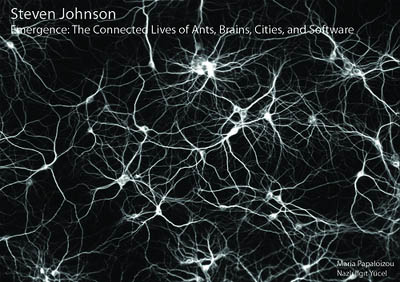From the Santa Fe Institute, this is an excellent podcast on the science of emergence – "when simple stuff develops complex forms and complex behavior" – and all which occurs as an innovation with no prior model. There are a lot of people (myself included) who believe emergence is the best explanation for the rise of consciousness from what seems to be an inert lump of fatty tissue.
Via Wikipedia:
In philosophy, systems theory, science, and art, emergence is the way complex systems and patterns arise out of a multiplicity of relatively simple interactions. Emergence is central to the theories of integrative levels and of complex systems.A couple of books on the subject include Steven Johnson's Emergence: The Connected Lives of Ants, Brains, Cities, and Software (2002), John Holland's Emergence: From Chaos To Order (Helix Books) (1999), and Harold Morowitz's The Emergence of Everything: How the World Became Complex (2004).
Biology can be viewed as an emergent property of the laws of chemistry which, in turn, can be viewed as an emergent property of particle physics. Similarly, psychology could be understood as an emergent property of neurobiological dynamics, and free-market theories understand economy as an emergent feature of psychology.
Audio: Emergence Is Happening All Around Us, and Not Just in Nature

Oct. 17, 2013
On Big Picture Science, a podcast/radio program that airs on public radio stations nationwide, in a program on emergence and self organization, SFI Research Fellow Simon DeDeo explains how emergence abounds not only in nature, but also in human social systems.
"Emergence is ... something so common that we almost don't even notice it happening around us," DeDeo says. In social systems, for example, "we can look at the emergence of political parties. But what is a political party? In some sense, an individual, a supporter, plays somewhat the same role as a neuron does in the human brain."
Individuals within the party don't have a lot of power to shift its platforms, he says, "but the collective behavior of all of us in that party and the way we interact within that party somehow lead to a set of emergent rules that we call political science. That kind of separation -- the separation between, for example, what we would call in physics the microphysics of system and the macroscale behavior, the way in which those two things split apart, that's the basic story of emergence."
He goes on to explain why emergence in both kinds of systems is likely a process driven by evolutionary advantage.
Other program guests included new Nobel laureate and molecular and cell biologist Randy Schekman (UC Berkeley), neurobiologist Steve Potter (Georgia Institute of Technology), biological anthropologist Terence Deacon (UC Berkeley), and computer scientist Leslie Valiant (Harvard).Listen to or download the podcast below.
Emergence
Monday 14 October 2013
Big Picture Science
Listen right now:
Download file
Your brain is made up of cells. Each one does its own, cell thing. But remarkable behavior emerges when lots of them join up in the grey matter club. You are a conscious being – a single neuron isn’t.
Find out about the counter-intuitive process known as emergence – when simple stuff develops complex forms and complex behavior – and all without a blueprint.
Plus self-organization in the natural world, and how Darwinian evolution can be speeded up.Guests:
- Randy Schekman – Professor of molecular and cell biology, University of California, Berkeley, 2013 Nobel Prize-winner
- Steve Potter – Neurobiologist, biomedical engineer, Georgia Institute of Technology
- Terence Deacon – Biological anthropologist, University of California, Berkeley
- Simon DeDeo – Research fellow at the Santa Fe Institute
- Leslie Valiant – Computer scientist, Harvard University, author of Probably Approximately Correct: Nature’s Algorithms for Learning and Prospering in a Complex World
Bagaimana Menarikkan Article Pada Hari Ini . BLUE.Jangan Lupa Datang Lagi Untuk Membaca Article Yang lebih Menarik Pada Masa Akan Datang/







Posting Komentar